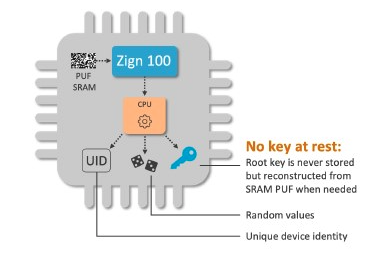Intrinsic ID Debuts Software-Only, Chip-Based Cybersecurity

Intrinsic ID announced a software-only solution that adds security to chips in Internet of Things (IoT) devices, highlighting a trend toward component-level cybersecurity.
The company’s announcement builds on its expertise in physical unclonable function (PUF) technology, which secures systems by identifying a device via unique characteristics of its internal chips.
Here's how it works: During the manufacturing process, each integrated circuit acquires slight variations in physical properties, or PUFs, which lead to subtle distinctions in its electronic signaling. These variations don’t affect the chip’s ability to perform the tasks it’s created for, but they allow it to be uniquely identified. PUF technology sets up a way to assign cryptographic keys to the “silicon fingerprint” of the chip.
“We create and install a root of trust for embedded systems and chips,” Intrinsic ID’s CEO and co-founder Pim Tuyls told Futuriom.

Intrinsic ID CEO and co-founder Pim Tuyls. Source: Intrinsic ID
Up to now, Intrinsic ID has offered software called Zign RNG that permits device manufacturers to incorporate a random number generator (RNG) associated with the PUFs in devices during production. Now, the vendor has released a software-only solution called the Zign X00 Series, which encrypts IoT data from devices that are already operational in the field.
In the past, establishing security via PUF in the field typically meant having to transmit information over the air to the device. Zign X00 eliminates that necessity.
“No secrets are sent over the air. A device creates its own secrets,” said CEO Tuyls.

Diagram illustrates one version of the Zign X00 series. Source: Intrinsic ID
A Solution for Millions of IoT Devices
Intrinsic ID was founded in 2008. It is headquartered in Sunnyvale, Calif., with an R&D facility in Eindhoven, The Netherlands. It spun out of Philips Research, a healthcare system research firm also based in Eindhoven. At the time, CEO Tuyls was principal scientist at Philips in charge of its cryptography research, and he brought with him to the startup an expertise in PUFs.
Business is brisk, Tuyls says. While he won’t state how much funding Intrinsic ID has garnered, he says the company’s profitable. Business doubled in 2022 over 2021. “We are in more than 500 million devices in the field,” he notes. These include microcontroller units (MCUs), application-specific integrated circuits (ASICs), and field programmable gate arrays (FPGAs) from leading chipmakers. Also included are data processing units (DPUs) from the likes of Fungible Inc., a former Futuriom 40 pick and an Intrinsic ID customer recently bought by Microsoft (Nasdaq: MSFT).
Designers and manufacturers incorporate Intrinsic ID's solutions in chips for use in IoT devices that serve a range of vertical areas. This includes edge gear in the aerospace and defense, business, manufacturing, banking, critical infrastructure, medical, and automotive sectors.
While most of these devices are in edge deployments, Tuyls said Intrinsic ID is looking to expand further into the datacenter market. There, he says, opportunities abound in high performance computing (HPC) applications in large datacenters. (Think those chips supporting HPC gear in hyperscaler cloud networks.)
What About Confidential Computing?
The PUF approach echoes that of confidential computing, which establishes secure enclaves within a CPU’s main processor. Both approaches secure devices at the chip level. Both support data in motion and data at rest via generated secret codes and cryptography keys. But Pim Tuyls says the two are complimentary, not mutually exclusive. “We can add to confidential computing,” he said. “We have customers using both for extra protection.” The PUF technology resides in chips that in turn reside in confidential computing enclaves. It’s a double-locked hardware root-of-trust.
Looking Ahead
Intrinsic ID is part of a growing trend toward chip-level security based on confidential computing or PUFs. Its chief competition comes from Taiwan-based eMemory Technology Inc.'s four-year-old subsidiary PUFsecurity, along with a range of startups.
So far, Intrinsic ID is holding its own in the market, and adoption of its widening product line hints at a bright future. If a rising tide floats all boats, Intrinsic ID is up front in the flotilla.



